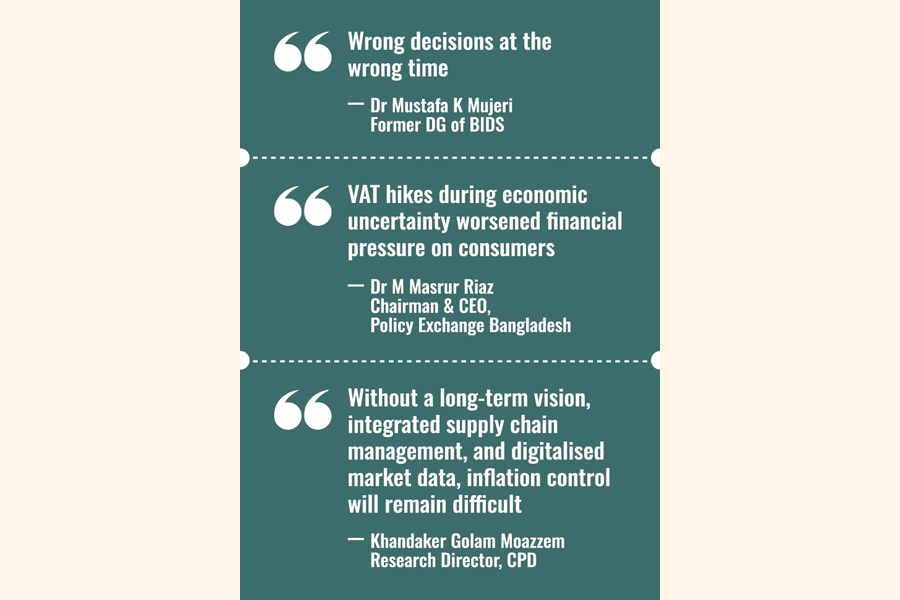
Published :
Updated :

Consumers are struggling with rising taxes amid higher inflation, experts observed on Wednesday, criticising overuse of the indirect taxation, particularly VAT, which is disproportionately affecting lower- and middle-income groups.
Besides, weak revenue collection raised concerns among the economists and business leaders at a roundtable in the city as the policymakers relied more on a quick fix instead of long-term structural reforms.
Jagonews24.com organised the roundtable titled "Additional Tax Burden on Consumers: Steps to Overcome".
In January 2025, the government raised the value-added tax (VAT) to 15 per cent over 43 categories of products and services on the excuse of improving the tax-GDP ratio and facilitating the country's economic growth.
Addressing the event, Khandaker Golam Moazzem, Research Director at the Centre for Policy Dialogue (CPD), said inflation was previously controlled artificially at around 6.0 per cent. However, the inflation has risen since March last year due to International Monetary Fund (IMF) conditions, he said.
"Food inflation drives overall inflation. The previous government attempted to stabilise prices through duty reductions, but rising import costs and appreciation of the US dollar have made those efforts ineffective," he says.
He also blamed market mismanagement and cited the sudden disappearance of soybean oil from shelves despite refiners claiming a steady supply.
"Without a long-term vision, integrated supply chain management, and digitalised market data, inflation control will remain difficult," he added.
Bangladesh faces a revenue shortfall of Tk 420 billion, while the IMF estimates it should be more than double at Tk 850 billion.
Dr Mustafa K Mujeri, former director general of BIDS, criticised the government's economic policies and termed: "Wrong decisions at the wrong time."
He observed that the IMF-led strategies have historically failed in Bangladesh. "Simply raising VAT is a short-term fix and it burdens consumers without addressing core revenue challenges," he said.
Dr M Masrur Riaz, Chairman and CEO of Policy Exchange Bangladesh, emphasised the need for Regulatory Impact Assessments (RIA) before imposing newer VAT, taxes.
He focused on key concerns like flawed approach and timing, saying VAT hikes during economic uncertainty worsened financial pressure on consumers.
Talking on regulatory issues, he said frequent changes in tax policies, discretionary tax authorities, and unpredictable SROs discourage investment. He also pointed out a lack of impact assessment.
"Tax policy decisions are made without evaluating their economic, environmental, or social impacts," he added.
"The government must adopt a pro-business and pro-taxpayer approach. Discretionary tax authorities must be reformed, and clear policy frameworks should be introduced," he said.
Doulot Akter Mala, a journalist at the Financial Express and President of the Economic Reporters' Forum (ERF), pointed out that automation in the tax system remains ineffective.
"Manufacturers face rising taxes, while competitors in other countries benefit from better policies," she added.
Shafiqul Rahman Bhuiyan, President of the Bangladesh Auto Biscuit and Bread Manufacturers Association, said: "A roadside vendor or rickshaw puller relies on biscuits and tea. The sudden VAT hike puts small manufacturers at risk."
Meanwhile, non-AC restaurants, mobile internet services, and airline tickets are among 43 items affected by VAT hikes, reducing demand.
Economists argue that expanding the tax base is a more sustainable approach than increasing indirect taxes.
"Currently, 67 per cent of individuals earning over Tk 10 million remain outside the tax net. Instead of overburdening existing taxpayers, the government should bring these individuals into the system," said economist Dr MM Akash.
SM Nazer Hossain, Vice President of the Consumers Association of Bangladesh (CAB), warned that traders often exploit VAT hikes by raising prices disproportionately, worsening inflation.
"Bangladesh's economic stability depends on sound tax policies. If we overburden businesses and consumers, we risk stagnating growth and discouraging investment," said Ashraf Ahmed, former President of Dhaka Chamber of Commerce and Industry (DCCI).
Bangladesh Agro Processors Association (BAPA) President MA Hashem warns that increased VAT and duties on processed food will raise prices, leading consumers to cut back on purchases.
This, in turn, will reduce companies' demand for agricultural raw materials, severely impacting farmers who will struggle to get fair prices for their crops like tomatoes.
He emphasised that higher taxes will force consumers to pay more for food, making affordable items like biscuits and cakes scarce.
This will hurt not only farmers but also low-income groups and the working class, he added.
Former member of the National Board of Revenue (NBR) Rezaul Hasan, Pran RFL Chairman Ahsan Khan Chowdhury, President of the Bangladesh Knitwear Manufacturers and Exporters Association (BKMEA) Mohammad Hatem, Managing Director of SMC Enterprise Limited Sayef Uddin Nasir, and ACI Foods' Faria Yasmin also spoke among others.
tonmoy.wardad@gmail.com


 For all latest news, follow The Financial Express Google News channel.
For all latest news, follow The Financial Express Google News channel.